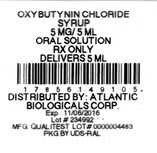Oxybutynin Chloride Solution while Breastfeeding

What is Oxybutynin Chloride Solution used for?
I am breastfeeding mother and I am using Oxybutynin Chloride Solution. Can it have any bad effect on my kid? Shall I search for better alternative?

Nursing Mothers It is not known whether this drug is excreted in human milk. Because many drugs are excreted in human milk, caution should be exercised when oxybutynin chloride is administered to a nursing woman.
Oxybutynin Chloride Solution Breastfeeding Analsys
Oxybutynin chloride while Breastfeeding
Low RiskCAS Number: 5633-20-5
Advice to take a minimal dose for a short time since anti-cholinergic drugs may decrease breast milk production. Check-up for anti-cholinergic symptoms (mouth dryness, constipation...)
Oxybutynin Chloride Solution Breastfeeding Analsys - 2
Oxybutynin chloride while Breastfeeding
CAS Number: 5633-20-5
No information is available on the use of oxybutynin during breastfeeding. Long-term use of oxybutynin might reduce milk production or milk letdown, but a single dose is not likely to interfere with breastfeeding. During long-term use, observe for signs of decreased lactation (e.g., insatiety, poor weight gain).
What should I do if I am breastfeeding mother and I am already exposed to Oxybutynin Chloride Solution?
Oxybutynin Chloride Solution is in the category of low risk, if you have already used it then its not a big deal if health and behavior of baby is good. However your health care provider shall be aware of the fact that you have used Oxybutynin Chloride Solution so you should inform him based on your convenience.
I am nursing mother and my doctor has suggested me to use Oxybutynin Chloride Solution, is it safe?
Oxybutynin Chloride Solution comes in category of low risk and if your doctor is aware that you are breastfeeding it should be ok to use
If I am using Oxybutynin Chloride Solution, will my baby need extra monitoring?
Not much monitoring required while using Oxybutynin Chloride Solution
Who can I talk to if I have questions about usage of Oxybutynin Chloride Solution in breastfeeding?
US
National Womens Health and Breastfeeding Helpline: 800-994-9662 (TDD 888-220-5446) 9 a.m. and 6 p.m. ET, Monday through Friday
UK
National Breastfeeding Helpline: 0300-100-0212 9.30am to 9.30pm, daily
Association of Breastfeeding Mothers: 0300-330-5453
La Leche League: 0345-120-2918
The Breastfeeding Network supporter line in Bengali and Sylheti: 0300-456-2421
National Childbirth Trust (NCT): 0300-330-0700
Australia
National Breastfeeding Helpline: 1800-686-268 24 hours a day, 7 days a week
Canada
Telehealth Ontario for breastfeeding: 1-866-797-0000 24 hours a day, 7 days a week
